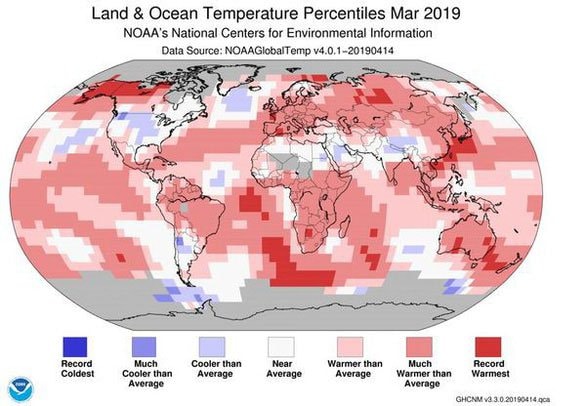Why is the 2019 hot season unusually hot?
Since the beginning of the year, the Berkeley Earth research organization (USA) has predicted that 2019 will likely be the second hottest year in history since 1850. Why is that?
In mid-February 2019, the Thai Meteorological Department warned people that the following months of this summer would be very hot and dry, with temperatures reaching 44 degrees Celsius in some places, lasting at least until the first rains of the season appear in May.
 |
| One common feature of climate change is that the weather becomes more extreme. |
In fact, since the beginning of the year, the world's leading climate scientists have predicted that the Earth will experience an unusual heat wave, with a 50% chance of 2019 breaking last year's record to become the second hottest year on record (since 1850).
And that happened this past March.
According to the US National Oceanic and Atmospheric Administration (NOAA), abnormal temperatures were recorded in many areas of Australia, northern Alaska Peninsula, northwestern Canada, southern Brazil, the Barents Sea, Tasman Sea and East China Sea, and additional areas scattered in the southern seas.
Meanwhile, a heat wave also swept across Europe during Easter. In Sweden, forests caught fire due to extreme dryness, while in England, Russia... people suddenly enjoyed summer air (25-26 degrees Celsius) while it was only spring (10 degrees difference from usual).
 |
| World temperature map March 2019, red is warmer than normal |
Meteorologists explain the strange weather in the Asia-Pacific region this summer partly due to the influence of the El Nino phenomenon, which makes the western Pacific region hotter and drier.
Climate change has also had a part in this summer’s weather. Berkeley Earth, a research organization based in California (USA), accurately predicted the current heat wave earlier this year by observing global temperatures.
In February, the US National Aeronautics and Space Administration (NASA) and NOAA officially announced that 2018 was the fourth warmest year in history since 1880, after 2015, 2016 and 2017. Thus, the past 5 years have been the warmest period in modern meteorological history.
NASA scientist Gavin Schmidt stressed that the current climate situation is caused mainly by CO emissions.2and other human greenhouse gases.
"The long-term impacts of climate change are already being felt - flooding in coastal areas, heatwaves, massive changes in rainfall and ecosystems"- Mr. Schmidt warned.

